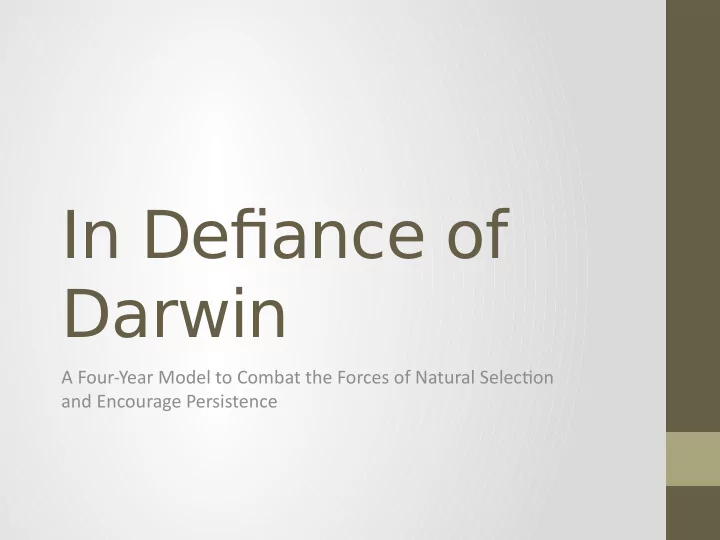

In Defjance of Darwin A Four-Year Model to Combat the Forces of Natural Selectjon and Encourage Persistence
The Old Story • Materialistjc • Elitjst • Fatalistjc
Pfeifger University • Private, four year liberal arts instjtutjon • Affjliated with the United Methodist Church • 3 Campuses • 2,000 students from 28 states and 17 countries • Achieved re-accreditatjon this past spring
Our Old Model • Freshmen “Seminar” • 3 SH for Conditjonally admits; 1SH for all others • Informatjon-based • Tools for the toolbox e.g., study, tjme-mgt & test-taking strategies • One semester • Front-Loaded
Pfeifger Journey • Is the name of the class that is embedded in the First Year Experience. • It is ofgered as a 2 SH class in the fall, or 201A • …and contjnues in the spring for 1SH, or 201B • In additjon to Pfeifger Journey we have introduced or revised several traditjons woven throughout the academic year e.g., • Convocatjon and the senior passing of the fmame • Social Mixers • Friendly competjtjon in a Journey talent show • An Honor and Integrity Assembly • Passages event in the spring
The Pfeifger Journey Experience also includes: • Coaching • The use of the EQ-I 2.0 • Challenge Course • Assemblies: Inspiratjonal; Ethics; Honor Code
Concept of a Journey • Grown from a First Year Experience to that of a Four-year Process • Sophomore Seminar as a part of the general educatjon ofgered as interdisciplinary, competency based ofgering • Junior Seminar ofgered as the same • Each level will be linked to co-curricular experiences such as externships, internships, research & travel
Freshman • Theme: Equipping and preparing for the journey • Purpose: Connectjng to self and connectjng to community • Competencies: Communicatjon & Collaboratjon • Delivery: seminar and core curriculum
Sophomore • Theme: exploratjon and discovery • Purpose: Experiencing possibilitjes, settjng forth • Competencies: Critjcal thinking and informatjon literacy • Delivery: Interdisciplinary encouraged
Junior • Theme: Traveler returns; returning to the center; the heroes welcome • Purpose: Integratjng and applying • Competencies: all four • Delivery: team taught interdisciplinary study and problem solving and actjonable results
Senior Theme: Launching, reaching and paying forward
What is Coaching? Coaching is about challenging and supportjng people, giving them the gifu of your presence. • Robert Hargrove, Masterful Coaching
Coaching as Stewardship & Empowerment • Stewardship is taking a stand for the future of the people, communitjes, complex social systems, and the world we care about. • Empowering people to create a future they desire based on unearthing what they passionately care about.
Pfeifger’s Coaching Model • Each Pfeifger Journey Instructor is an advisor and coach • As a result of a Cannon Trust grant we provided training in coaching and the use of Eqi-2.0 2011-12 • Beginning this academic year we meet with each student 3-4 tjmes per semester outside of class
Results to Date • 92% retentjon from fall to spring • (88% in 2011-12) • 83% retentjon from freshmen to sophomore year • (78% in 2011-12)
Implications • Coaching students in a personalized way increases success as we are able to more thoroughly custom plan for each student • Student coaching seeks to motjvate students to actjon and move them from an experience of “spectator sport” to a more engaged experience. • Coaching provides an invaluable maturatjon process to some and nurturing and support to the more ambitjous students • Eqi-2. ofgers a tool for metacognitjon &
The New Story • Humanistjc • Holistjc • Infjnitely more hopeful
Contact Information • Deborah Burris, Director First Year Experience and Asst. Prof. Communicatjon Studies • Deborah.Burris@pfeifger.edu • 704-463-3359 Jim Gulledge, Director of Academic Support Services - Jim.Gulledge@pfeifger.edu - 704-463-3366
Bibliography • Aanstad,J. & Journdan, C..(2012). People skill handbook: Actjon tjps for improving your emotjonal intelligence. • Egan,G. (2010). The skilled helper: A problem-management and opportunity-development approach to helping. • Stein, S. & Book, H..(2006). The EQ edge: Emotjonal intelligence and your success. • Zachary, L. (2012). The mentor’s guide: Facilitatjng efgectjve learning relatjonships .
Recommend
More recommend